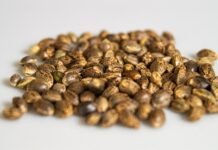The spine is a delicate yet powerful structure that supports the entire body. When it’s healthy and functioning correctly, it allows you to stand upright and move with agility and grace. But when your spine isn’t working well, it can cause pain, limit your ability to perform daily activities, and affect other parts of your body.
The effects of poor spine health can be far-reaching, causing pain and immobility and affecting your mood, digestion, and even your breathing. However, taking some simple steps to protect your spine can significantly reduce the risk of developing problems later.
To keep your spine healthy, follow these nine tips for optimal diet and nutrition.
1. Exercise And Stretch Regularly
Maintaining good spine health is essential for living a pain-free and active life. Unfortunately, many people suffer from back pain due to poor posture, insufficient exercise, and problems with alignment. However, there are several things you can do to keep your spine healthy and strong.
First, it’s essential to exercise regularly. This will help improve your flexibility and prevent the buildup of tension in your muscles. Second, be sure to stretch regularly. Stretching helps to lengthen your muscles and keep them from becoming tighter and causing pain. Finally, pay attention to your posture.
Make sure you’re sitting and standing up straight, as this will help remove the strain off your spine. Following these simple tips can maintain excellent spine health and avoid pain and discomfort. If you’re looking for a specific treatment plan or exercise, checking out reliable websites like https://www.walkerspineandsport.com/back-and-neck-pain can help you find the perfect routine.
2. Eat Plenty of Vegetables and Fruits
Eating plenty of vegetables and fruits is excellent for spine health. These foods contain essential nutrients for strong bones and healthy tissues. For example, vitamin C is necessary for producing collagen, a protein that helps keep our bones and muscles strong.

Vitamin C can be found in citrus fruits, tomatoes, potatoes, and leafy green vegetables. Calcium, another essential nutrient for healthy bones, can be found in dairy products, dark leafy greens, sardines, and tofu. In addition to these crucial nutrients, vegetables and fruits also contain fiber, which helps promote a healthy digestive system.
A healthy digestive system is essential for maintaining a healthy weight, as excess weight can strain the spine. If you’re unsure where to start, consulting a dietitian can help you develop the best meal plans according to your lifestyle and needs.
3. Drink Enough Water
Most people know that staying hydrated is essential for overall health, but did you know that drinking enough water is also necessary for maintaining a healthy spine? The discs in your spine are made mostly of water, and they need to stay hydrated to function properly.
When you don’t drink enough water, the discs can become dehydrated and shrink, leading to back pain. In addition, water is necessary for producing collagen, the main component of cartilage. Cartilage is what cushions the vertebrae in your spine, and without enough water, it can become brittle and break down.
It can cause pain and other problems, such as pinched nerves or herniated disks. To avoid these problems, aim to drink eight glasses of water daily. You may need even more if you’re exercising or working in a hot environment. By keeping your spine hydrated, you can help prevent back pain and keep your spine healthy.
4. Avoid Processed Foods And Additives
Processed foods have been modified from their natural form to prolong their shelf life. Additives are chemicals added to food to enhance taste, consistency, or appearance. Both processed foods and additives can be problematic for the body to digest and may cause inflammation.
Inflammation is a leading cause of back pain and other spine problems. In addition, processed foods and additives are often high in sugar, leading to weight gain. Excess weight strains the spine, increasing the risk of pain and injury.
To keep your spine healthy, it’s best to avoid processed foods and additives as much as possible. Instead, focus on eating fresh, whole foods that are rich in nutrients and easy for the body to digest. These lifestyle choices will help keep your spine strong and prevent the onset of pain.
5. Take Your Supplements
Diets sometimes don’t provide enough of the nutrients we need for a healthy spine. That’s where supplements come in. By taking a daily supplement, you can ensure your spine gets the nutrients it needs to stay strong and healthy. There are a few essential nutrients that are particularly important for spine health.
Calcium is vital for strong bones, and vitamin D helps your body absorb calcium. Vitamin C is also important for bone health, as it helps your body produce collagen, a key component of bone tissue.
Omega-3 fatty acids are another essential nutrient for spine health. They help reduce pain and stiffness due to inflammation. If you want to improve your spine health, talk to your doctor about which supplements might be right for you.
6. Quit Smoking
Smoking is one of the worst things you can do for your spine health. It’s been linked to an increased risk of developing degenerative disc disease and other back problems. So if you’re a smoker, here’s why you should quit:
- Smoking damages the discs in your spine. The discs are the cushions between the bones in your spine, and they help absorb shock and protect the bones from wear and tear. Furthermore, smoking decreases blood flow to the discs, which can cause them to weaken and break down. Over time, this can lead to degenerative disc disease and other back problems.
- Smoking also increases inflammation throughout the body, including the spine. It can contribute to the development of back pain and other problems. In addition, smoking impairs healing and makes it more difficult for the body to repair damaged tissues. If you have a spine problem, smoking will worsen it.
Quitting smoking is one of the best things you can do for your spine health. Not only will it help prevent the onset of pain and other problems, but it will also improve the health of your discs and make it easier for your body to heal.
7. Avoid Excessive Alcohol Consumption
Drinking too much alcohol can hurt the spine in several ways. First, it can lead to dehydration, which can cause the disks in the spine to shrink and become less effective at cushioning the vertebrae. Second, alcohol can damage the cartilage that covers the vertebrae and other joints in the body.
This damage can lead to arthritis, which causes pain, stiffness, and inflammation in the joints. Finally, excessive alcohol consumption can interfere with bone growth and lead to osteoporosis, a condition characterized by weak bones. All of these effects can lead to chronic back pain and other problems.
In addition to the spine-related problems listed above, excessive alcohol consumption can lead to liver damage, pancreatitis, heart disease, cancer, and other health problems. If you want to protect your spine health, it’s essential to avoid heavy drinking.
8. Eat Anti-Inflammatory Foods
Chronic inflammation is a significant cause of pain and discomfort throughout the body, and the spine is no exception. When inflammation goes unchecked, it can lead to various problems, including stiffness, joint pain, and even nerve damage. Fortunately, there are a number of foods that have anti-inflammatory properties that can help keep the spine healthy and free from pain.
Some of the best anti-inflammatory foods for spine health include omega-3 fatty acids, turmeric, ginger, and garlic. Omega-3 fatty acids help reduce inflammation throughout the body and are abundant in fish such as salmon and tuna. Turmeric is a spice that has been used for centuries to treat pain and inflammation, and ginger has similar properties.
Garlic is another excellent food for reducing inflammation and has antibacterial and antiviral properties that can help keep the entire body healthy. Including these anti-inflammatory foods in your diet contributes to excellent spine health.
9. Avoid Drinking Too Much Caffeine
You may love your morning cup of coffee, but did you know that too much caffeine can harm your spine? That’s right. While a moderate amount of caffeine can help improve your focus and alertness, large amounts can increase anxiety and muscle tension.
When your muscles are tense, they’re more likely to strain or spasm, which can cause pain in the lower back and other spine regions. So if you want to keep your spine healthy, limiting your caffeine intake is essential. But that doesn’t mean you have to give up coffee entirely. Just make sure you drink it in moderation.
Limiting caffeine intake to no more than 200 milligrams per day is best for excellent spine health. That’s about the amount of caffeine in one cup of coffee. Enjoy your morning cup of coffee, but monitor your caffeine intake throughout the day to avoid drinking too much.
Takeaway
There are many things you can do to keep your spine healthy. Some of the most important include maintaining a healthy weight, exercising regularly, stretching, and paying attention to your posture. Additionally, it’s essential to eat anti-inflammatory foods, avoid drinking too much caffeine, and limit your alcohol consumption. By following these simple tips, you can maintain a healthy spine and avoid pain and discomfort.


























